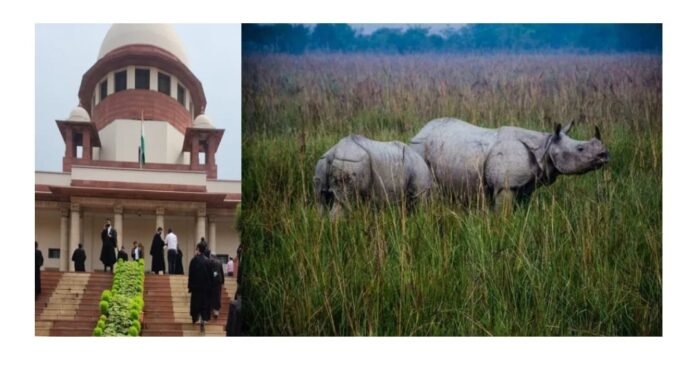In a recent development, the Supreme Court has issued a directive to both the central government and the Assam state government, requesting their responses to a plea that seeks the declaration of the area surrounding Pobitora Wildlife Sanctuary as an eco-sensitive zone. The move comes in response to concerns raised by environmental activists and wildlife conservationists.
Pobitora Wildlife Sanctuary, located in Assam, is renowned for its rich biodiversity and is home to the Indian one-horned rhinoceros, a critically endangered species. Spread over an area of approximately 38 square kilometers, the sanctuary serves as a vital habitat for numerous plant and animal species. It plays a significant role in preserving the ecological balance of the region and contributes to the overall conservation efforts in Assam.
The plea submitted to the Supreme Court highlights the need for enhanced protection measures in the vicinity of Pobitora Wildlife Sanctuary to safeguard its fragile ecosystem and wildlife. The proponents of the plea argue that declaring the area as an eco-sensitive zone is essential to mitigate potential threats posed by human activities, such as encroachment, deforestation, and illegal wildlife trade.
The court’s notice reflects its acknowledgment of the plea and its intention to examine the matter closely. By seeking responses from both the central and state governments, the Supreme Court aims to gather comprehensive information and perspectives on the issue.
If the area around Pobitora Wildlife Sanctuary is declared an eco-sensitive zone, it would entail implementing stringent regulations to balance the needs of conservation with sustainable development. Such a designation would likely impose restrictions on certain activities within the zone, including mining, construction, and industrial projects, to prevent any adverse impact on the sanctuary’s ecological integrity.
Eco-sensitive zones are designated areas where the ecological and environmental features require special protection. These zones serve as buffers around protected areas and help maintain the ecological balance by limiting human intervention and preserving the natural habitats. They play a crucial role in conserving wildlife, maintaining water resources, and supporting local communities.
The case at hand highlights the growing concern for the preservation of wildlife habitats and the need to strike a balance between development and conservation. The Supreme Court’s intervention reflects its commitment to ensuring environmental protection and the conservation of India’s diverse wildlife. The court’s decision in this matter could have far-reaching implications for the conservation efforts and sustainable development initiatives in and around Pobitora Wildlife Sanctuary.
As the central and Assam governments prepare their responses, stakeholders and experts eagerly await the outcome of the plea. The court’s decision in this case could set an important precedent for the protection of ecologically sensitive areas and underline the judiciary’s role in addressing environmental concerns. It is important to stay updated with the latest news and developments in this case, as it showcases the significance of preserving our natural heritage.




